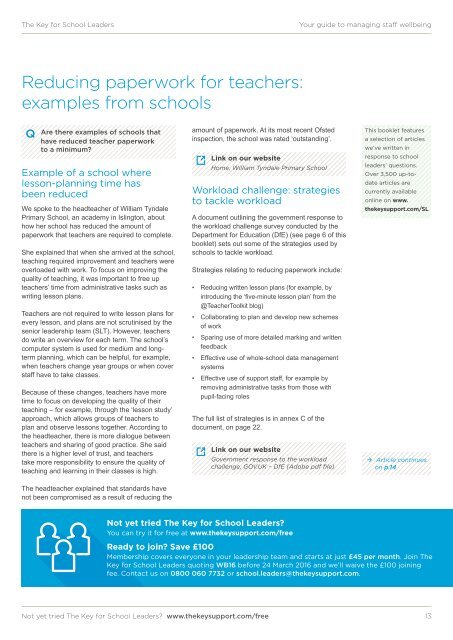Your guide to managing staff wellbeing
25ybGf5
25ybGf5
You also want an ePaper? Increase the reach of your titles
YUMPU automatically turns print PDFs into web optimized ePapers that Google loves.
The Key for School Leaders<br />
<strong>Your</strong> <strong>guide</strong> <strong>to</strong> <strong>managing</strong> <strong>staff</strong> <strong>wellbeing</strong><br />
Reducing paperwork for teachers:<br />
examples from schools<br />
Are there examples of schools that<br />
have reduced teacher paperwork<br />
<strong>to</strong> a minimum?<br />
Example of a school where<br />
lesson-planning time has<br />
been reduced<br />
We spoke <strong>to</strong> the headteacher of William Tyndale<br />
Primary School, an academy in Isling<strong>to</strong>n, about<br />
how her school has reduced the amount of<br />
paperwork that teachers are required <strong>to</strong> complete.<br />
She explained that when she arrived at the school,<br />
teaching required improvement and teachers were<br />
overloaded with work. To focus on improving the<br />
quality of teaching, it was important <strong>to</strong> free up<br />
teachers’ time from administrative tasks such as<br />
writing lesson plans.<br />
Teachers are not required <strong>to</strong> write lesson plans for<br />
every lesson, and plans are not scrutinised by the<br />
senior leadership team (SLT). However, teachers<br />
do write an overview for each term. The school’s<br />
computer system is used for medium and longterm<br />
planning, which can be helpful, for example,<br />
when teachers change year groups or when cover<br />
<strong>staff</strong> have <strong>to</strong> take classes.<br />
Because of these changes, teachers have more<br />
time <strong>to</strong> focus on developing the quality of their<br />
teaching – for example, through the ‘lesson study’<br />
approach, which allows groups of teachers <strong>to</strong><br />
plan and observe lessons <strong>to</strong>gether. According <strong>to</strong><br />
the headteacher, there is more dialogue between<br />
teachers and sharing of good practice. She said<br />
there is a higher level of trust, and teachers<br />
take more responsibility <strong>to</strong> ensure the quality of<br />
teaching and learning in their classes is high.<br />
The headteacher explained that standards have<br />
not been compromised as a result of reducing the<br />
amount of paperwork. At its most recent Ofsted<br />
inspection, the school was rated ‘outstanding’.<br />
Link on our website<br />
Home, William Tyndale Primary School<br />
Workload challenge: strategies<br />
<strong>to</strong> tackle workload<br />
A document outlining the government response <strong>to</strong><br />
the workload challenge survey conducted by the<br />
Department for Education (DfE) (see page 6 of this<br />
booklet) sets out some of the strategies used by<br />
schools <strong>to</strong> tackle workload.<br />
Strategies relating <strong>to</strong> reducing paperwork include:<br />
• Reducing written lesson plans (for example, by<br />
introducing the ‘five-minute lesson plan’ from the<br />
@TeacherToolkit blog)<br />
• Collaborating <strong>to</strong> plan and develop new schemes<br />
of work<br />
• Sparing use of more detailed marking and written<br />
feedback<br />
• Effective use of whole-school data management<br />
systems<br />
• Effective use of support <strong>staff</strong>, for example by<br />
removing administrative tasks from those with<br />
pupil-facing roles<br />
The full list of strategies is in annex C of the<br />
document, on page 22.<br />
Link on our website<br />
Government response <strong>to</strong> the workload<br />
challenge, GOV.UK – DfE (Adobe pdf file)<br />
This booklet features<br />
a selection of articles<br />
we’ve written in<br />
response <strong>to</strong> school<br />
leaders’ questions.<br />
Over 3,500 up-<strong>to</strong>date<br />
articles are<br />
currently available<br />
online on www.<br />
thekeysupport.com/SL<br />
à Article continues<br />
on p.14<br />
Not yet tried The Key for School Leaders?<br />
You can try it for free at www.thekeysupport.com/free<br />
Ready <strong>to</strong> join? Save £100<br />
Membership covers everyone in your leadership team and starts at just £45 per month. Join The<br />
Key for School Leaders quoting WB16 before 24 March 2016 and we’ll waive the £100 joining<br />
fee. Contact us on 0800 060 7732 or school.leaders@thekeysupport.com.<br />
Not yet tried The Key for School Leaders? www.thekeysupport.com/free<br />
13


